7 Essential Tips for Flying Budget Airlines in the US
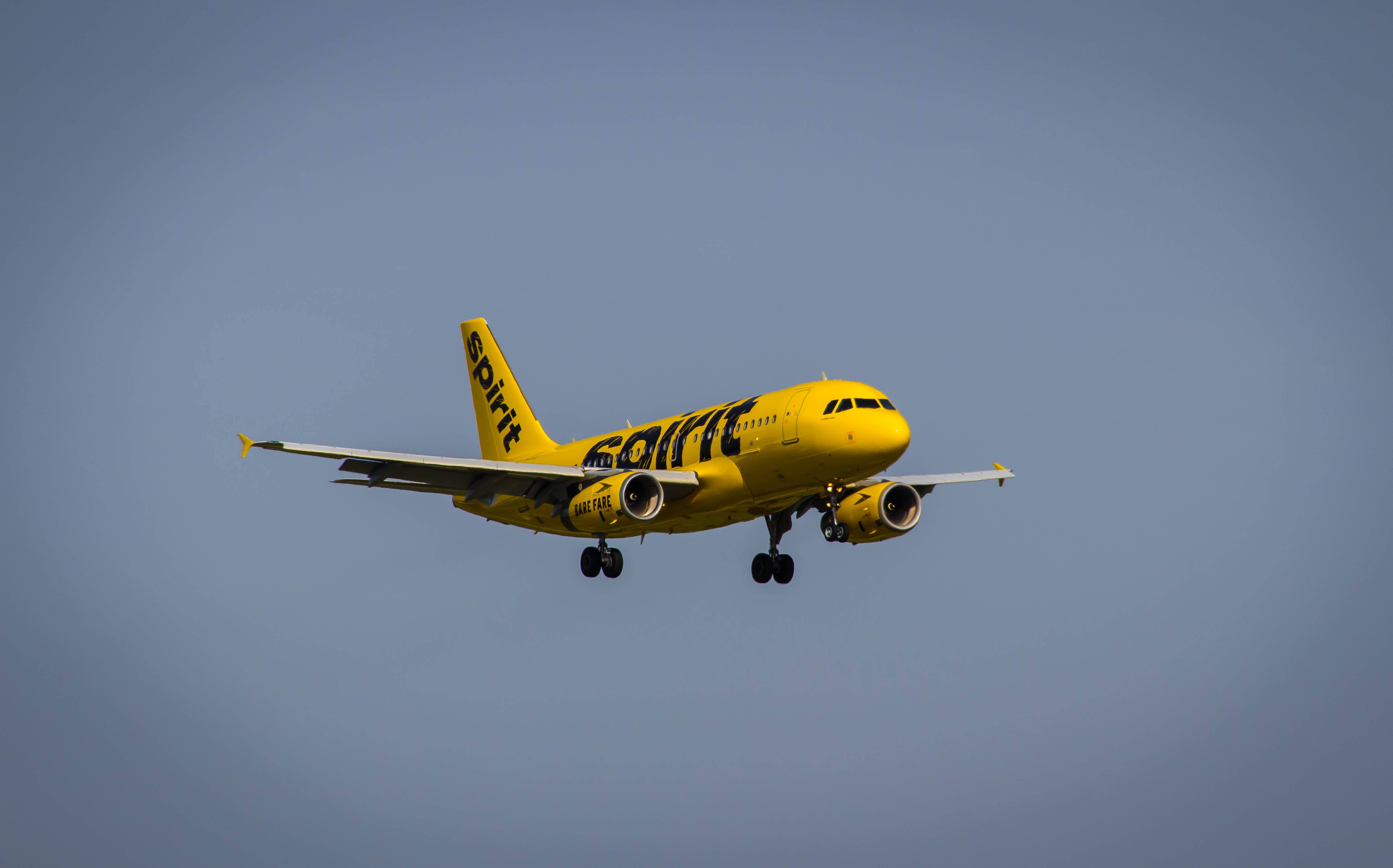
As a frequent traveler, I've flown all sorts of airlines (and airplanes) in all different parts of the world. I've flown in everything from huge planes over oceans to tiny prop planes over mountains.
And I'm well versed when it comes to budget airlines all around the world.
But I know that, for most Americans, the concept of the “budget airline” is a relatively new one. While these low-cost carriers have been flying to and fro for years in Europe and Asia, it's only within the last few years that they've really gained a foothold in the U.S.

Many people assume that these budget airlines are inferior to their “major” counterparts. But you know what? That really hasn't been the case in my experience.
The problem is that many Americans, used to what you get when you buy a ticket on a major airline, don't always know what to expect from a budget airline – and therefore get frustrated when things work a little differently.
So I'm here to (hopefully) demystify some things by sharing some tips for flying budget airlines in the United States.
Here are all my tips for flying budget airlines in the US:
1. Pay attention to how the fares work
Even the “big guys” in the airline industry in the U.S. are doing this now – charging extra for things that you used to get for free. When booking a flight with ANY airline (and especially the budget ones), be sure you know what you get for the fare you're paying.
Spirit Airlines, for example, offers a “Bare Fare,” which is exactly what it sounds like. It even says right on their site that “A ticket with us gets you and a personal item from A to B.” This means no free checked bag, no freedom to choose a seat, no free snack or drink, and just a small purse or laptop bag allowed on board. You can, of course, pay extra for all those extra things – but the lowest fares won't include any of it automatically.
This also means that many of those ridiculously low fare deals you see advertised online may not reflect what you'll actually pay if you want to check a bag, choose your own seat, etc. You need to look into all the extras before booking anything.
2. Compare prices with other airlines
Even though no one likes to feel like they're being nickeled and dimed, the truth is that even WITH paying extra for baggage and seat assignments and food, your ticket may still be a good deal cheaper than what you'd find on a larger airline. I once flew across the country on a budget airline (with a paid carry-on and paid seat assignment both ways) for $200 less than the next-cheapest fare – and it was a nonstop flight, too!
So before you click that “book” button, be sure to shop around a bit. There's more competition than ever when it comes to budget airlines in the U.S., meaning you can sometimes find some extra-great deals.
3. Be smart about packing
A feature of *nearly* every budget airline in the U.S. is that you have to pay not only for check-in baggage, but ALSO for carry-on baggage that's larger than the accepted “personal item” size. This means you'll be paying for that overstuffed rolly suitcase, no matter how artfully you packed it.
So when you're booking your ticket, think carefully about how you'll be packing. On some airlines, it's actually cheaper to purchase a checked bag than it is to add on a carry-on suitcase. So if you can survive on the plane without all of your possessions sitting in the overhead bin above you, you may save a few dollars.
Whatever you do, DON'T show up to check-in or the boarding gate with more carry-on items than your ticket says you've paid for. You won't be able to sneak on an extra bag, and they WILL make you pay for it (and pay MORE for it) at the desk or gate. Don't be that person who holds up boarding for everyone else because you thought the baggage policy wouldn't apply to you.
4. Come prepared with your own snacks
No free food on budget airlines, remember? And this usually applies to cross-country flights, too.
But, let's be honest here: Who actually *enjoys* airplane food these days anyway? Other than the little bags of pretzels you sometimes get, it's overall pretty awful. I prefer to bring my own snacks and food anyway. And you CAN do this! While you can't bring outside liquids past airport security in the U.S., you usually won't have an issue bringing in food, especially if it's wrapped or packaged.
5. Print your tickets at home
Controversial as the practice has become, many budget airlines will charge you extra if you want to check in with an agent at the airport. To avoid this extra fee, all you have to do is print your ticket at home before you go to the airport. I usually do this anyway because it means even less unnecessary time spent standing in a line at the airport.
And for the return journey when you won't BE at home? Almost every hotel I've ever stayed at has either had a business center with a printer for guests to use, or the front desk was able to print out my boarding pass for me.
6. Read the fine print
As with any large purchase you make, be sure to read the fine print! How much extra will you pay if you decide to pay for a checked bag at the airport instead of online when you book your ticket? Will paying for a carry-on bag ahead of time net you priority boarding? Are you able to get a refund under any circumstances?
The best way to ensure you aren't surprised by any extra fees is to read everything carefully and know exactly what you're getting for the price you pay.
7. Get travel insurance
Lastly, I'm always a big advocate of purchasing travel insurance, especially for big trips and expensive flights. Many airlines (even the budget ones) offer flight insurance when you purchase your ticket. Some of these options just cover you if you have to cancel your flight, while others allow you modify your itinerary, too. (Spirit Airlines, for example, offers both general flight insurance and Flight Flex, which lets you change your plans once for free up to 24 hours before your flight.)
Whether you purchase this flight-specific insurance or not is up to you. But I DO suggest getting overall travel insurance for any trip that you're spending a significant amount of money on. For basic and affordable coverage anywhere in the world, I always get insurance through World Nomads. I've (thankfully) never had to use it, but knowing that it's there in any emergency – from something as small as having my luggage lost to something as huge as getting into an accident and needing medical care – gives me peace of mind.
How US budget airlines differ from budget airlines elsewhere:
Now, if you're from outside the US, you may have a preconceived notion about our budget airlines based on similar airlines you've flown elsewhere in the world. But the truth is that budget airlines in the United States differ from their counterparts abroad.
The planes aren't that much different
I've flown both “regular” and budget airlines in Europe, and at times you definitely can tell the difference based on the planes you fly on. But, in the US, *most* budget airlines actually fly newer planes. And, with almost all of the big airlines in America re-fitting their planes with smaller, more uncomfortable seats lately, you don't notice much of a difference flying on a budget ticket any more.
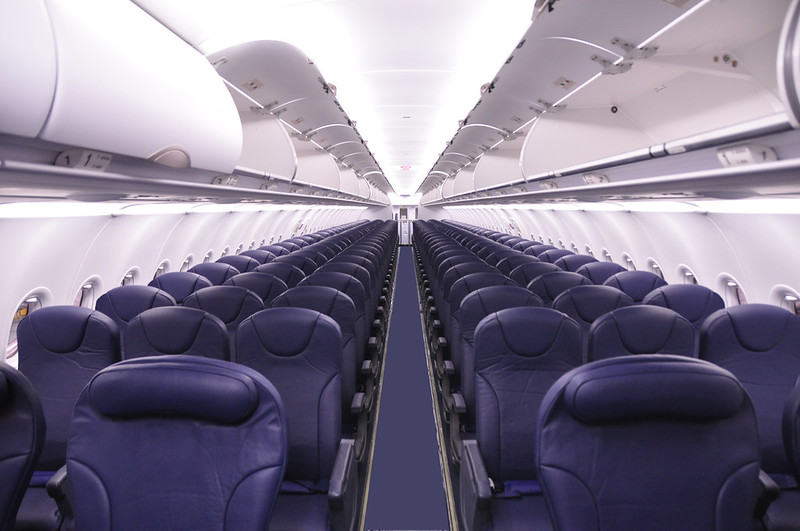
Budget carriers in the US actually do fly into major airports
In Europe, a big complaint (and the butt of many jokes) about low cost carriers is that they often fly into smaller alternative airports that are usually far outside large city centers. In the US, though, you'll usually find the budget carriers sitting at gates of major airports right alongside their big airline counterparts.
Want to fly to Las Vegas on a budget airline? You'll fly right into McCarran International. Want to take the family to Disney? You can fly right into Orlando International.
And, in many cases, when budget airlines in the US do fly into smaller, alternative airports, these airports are actually WAY better and preferable to bigger hubs. For example, I'm really excited that Spirit Airlines is now going to be flying routes from Akron/Canton to several new destinations, including Las Vegas and Myrtle Beach in 2017, and Orlando, Fort Lauderdale, Fort Myers, and Tampa later this month. Akron/Canton is a nice little airport that I like SO much better than Cleveland, so this is great news for me!
(And even though a couple of these routes aren't starting up until 2017, you can start booking travel on Spirit.com now.)
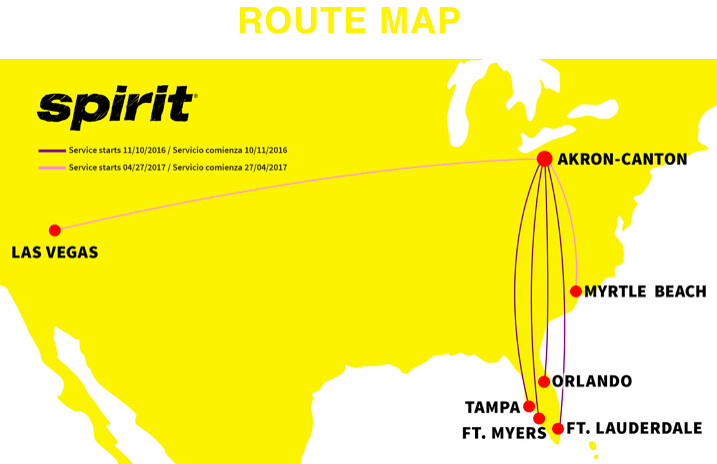
(Check out everywhere Spirit Airlines flies, too – you may be surprised by where you can go.)
So, in conclusion, here are the things you need to remember about budget airlines in the US:
- Fares are often cheaper, but you need to pay attention to exactly what you're getting.
- You'll pay extra for most things, and you just have to accept this.
- You should probably learn to pack light to avoid extra baggage fees.
- Get travel insurance. Just do it.
If you keep all these tips in mind, you should have no problem successfully saving money AND getting from Point A to Point B without any issues!
So what do you think? Have you flown with budget airlines in the US or abroad?
*Note: This post was brought to you in partnership with Spirit Airlines. As always, though, all opinions and tips are 100% my own (and I am genuinely stoked to have more flight offerings from Akron/Canton soon!!).

Amanda Williams is the award-winning blogger behind A Dangerous Business Travel Blog. She has traveled to more than 60 countries on 6 continents from her home base in Ohio, specializing in experiential and thoughtful travel through the US, Europe, and rest of the world. Amanda only shares tips based on her personal experiences and places she's actually traveled!

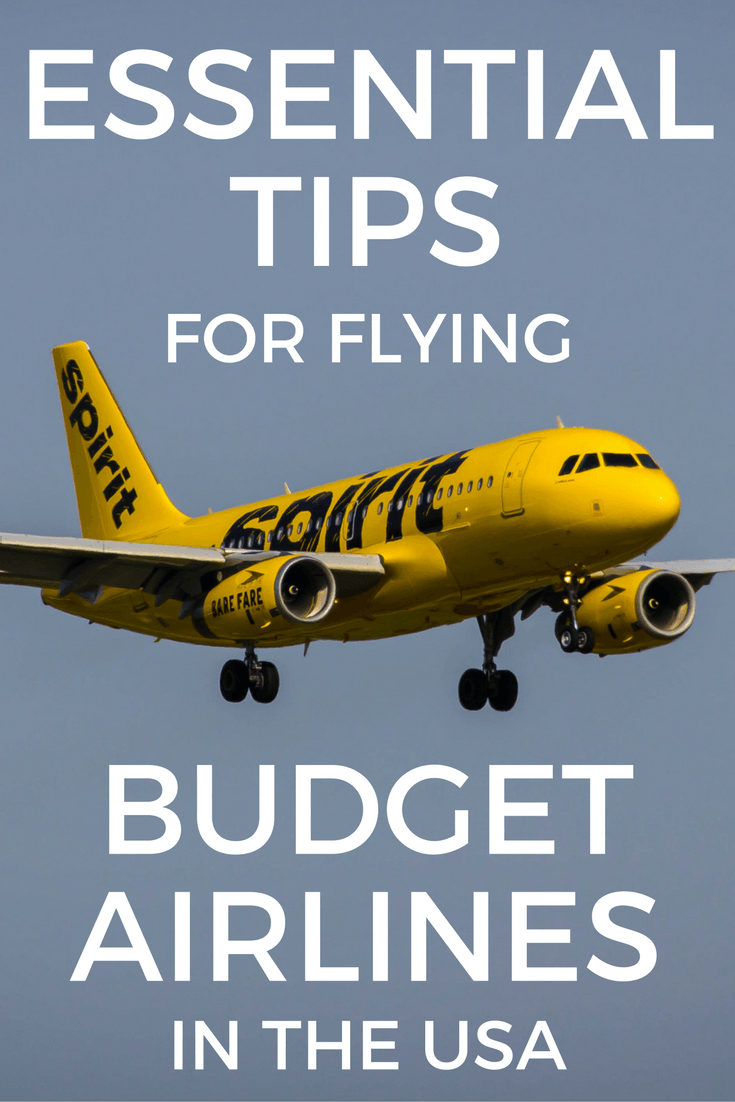
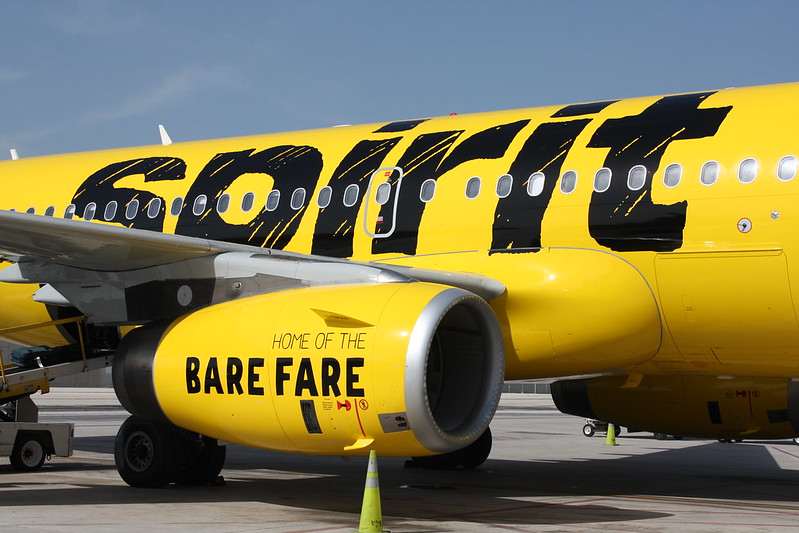

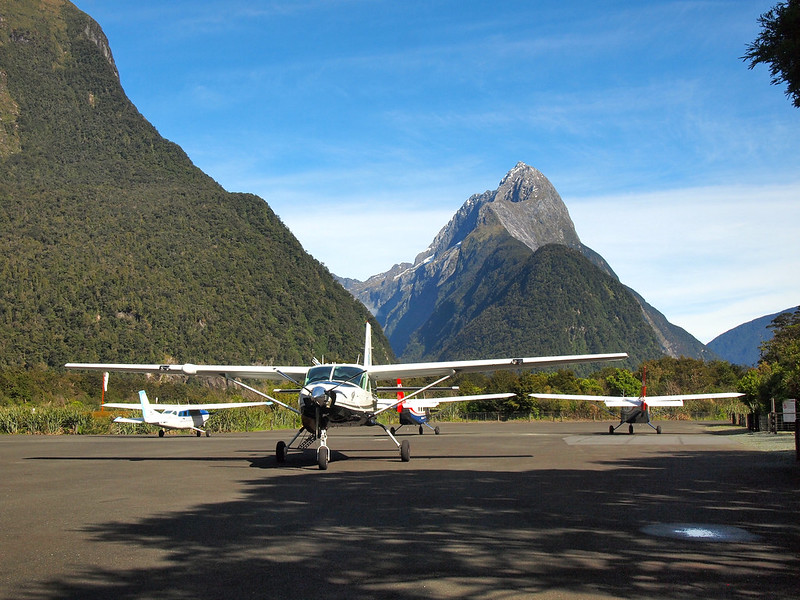
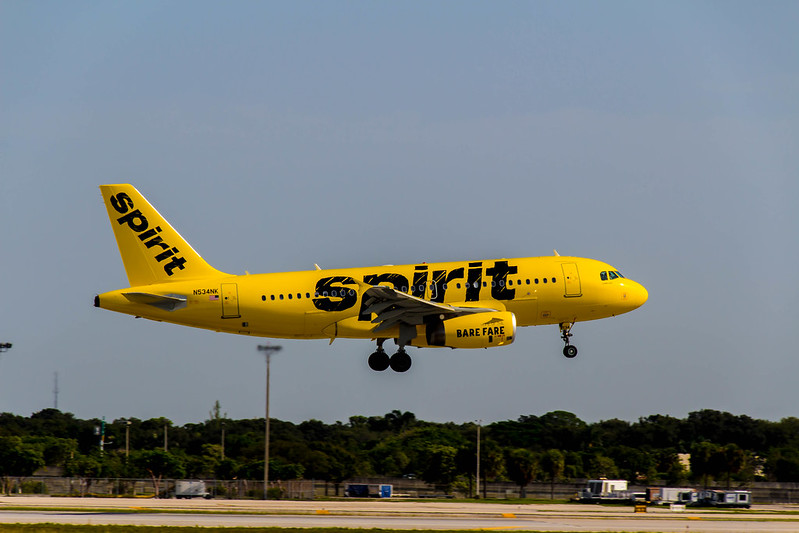

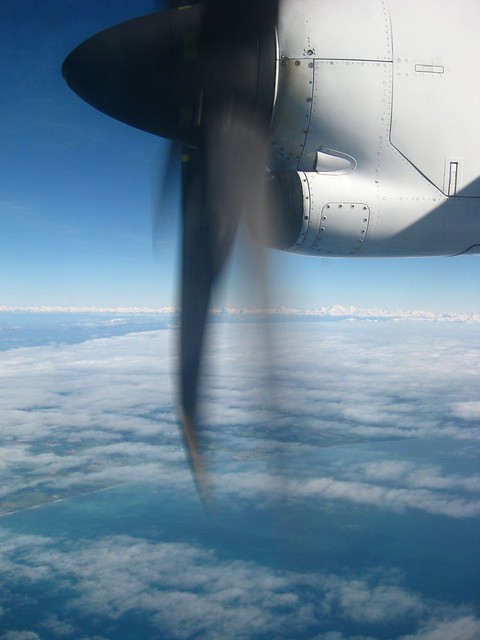









[…] (i.e. one that charges extra for things like carry-on bags and seat assignments), but as long as you know what to expect going in, you shouldn’t run into major […]
‘Nice one Amanda!
I’m European so of course, I’m used to flying budget airlines and have flown many over time. And of course, there are budget airlines and there are no-frills airlines. And they’re not basically the same thing lol!
A great recommendation is Easyjet for Europe and AirAsia for Asia. Ryanair is a no-frills airline. I’ve even flown with them a few times for nothing while only paying the tax! However, this only works if you’re flying short-haul, and have absolutely no luggage at all. It’s great when you’re young, broke, and have all the time in the world! I’m older and wealthier and my time is money nowadays so…!
I’ve flown quite a few budget airlines in Europe and have never had a truly awful experience. I definitely believe that as long as you know what to expect going in, you’re almost always bound to have a better experience!
I think if I flew as much as you do, I’d be more open to budget airlines. I fly about 6 times a year, therefore really try to consolidate my trips to American and United for mileage purposes. I have lots of friends in Chicago who are big fans of SouthWest, though!
That totally makes sense, and I’d say it’s a smart move! Gotta collect those miles when you can. Most of the budget airlines in the US also have mileage programs, too, but you of course can’t use them on any other airlines since they aren’t in any airline alliances.
You don’t need travel insurance.
If the plane crashes and you need medical care, it’s covered. If there is a delay or a flight is cancelled, it’s covered. All of this is a matter of statute, you don’t need to cover it twice.
I have been to 51 countries without travel insurance.
Not necessarily true depending on what country you are from/traveling in! Most US airlines are NOT required to give you anything for a delayed or canceled flight. They will get you on the next available flight, but it could literally be days later. If you get stuck somewhere overnight, you’re on your own for a hotel room and food. And if something happens to YOU that makes you miss your flight (i.e. you get sick), the airline won’t refund you – but your travel insurance usually will. Same goes with lost luggage – US airlines don’t have to reimburse you the way European airlines do.
And then there are just the normal medical-type things to think about, too. I have a friend who broke his back in the Amazon and had to get airlifted out. If he had been without travel insurance, he would have had to pay for that medical evacuation himself!
Agreed – I wouldn’t DREAM of traveling overseas w/o travel insurance. I’ve bought it perhaps half a dozen times and used it three times now (once for a minor item; twice for major incidents) and was so grateful I had it!
I flew Spirit for the 1st time last month from LGA to DTW and was very trepidatious about it. Mostly their horrific reputation for major delays and cancellations.
But I was pleasantly surprised that it was like any other flight, and everything went smoothly. I was surprised the seats didn’t recline, and the cost of a beverage, but I knew what to expect in terms of the bare fare and baggage fees, and I would fly them again.
I’m thrilled they’re now flying into CAK (I’m from Hudson), but I wish they’d connect OH to LGA!
I’ve actually had more delays/cancelations of late on airlines like United and American than any of the budget airlines I’ve flown! (Though, I think it says more about the general state of airlines in the U.S. than anything else…) But yes… I think that as long as you know what to expect going in, there’s no reason why flying budget has to be bad.
And yes, very excited about the new CAK routes. I live in Twinsburg, and would fly from Akron over Cleveland any day!
Lately I’ve been flying into CLE – more options (even though some require the dreaded Newark), and my boyfriend can pick me up from his nearby office. I’ve only one option for CAK, and it’s the cost of flying cross-country, so I haven’t flown there in a while.
Twinsburg – right down the street!